高中英语虚拟语气用法复习总结
(完整版)英语虚拟语气语法归纳总结
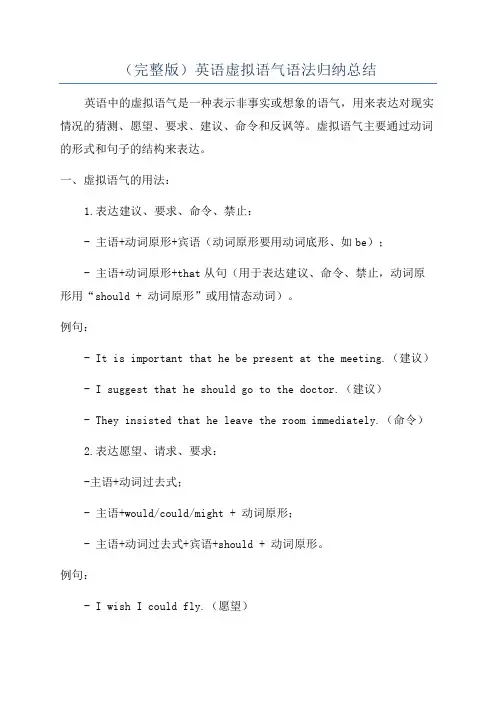
(完整版)英语虚拟语气语法归纳总结英语中的虚拟语气是一种表示非事实或想象的语气,用来表达对现实情况的猜测、愿望、要求、建议、命令和反讽等。
虚拟语气主要通过动词的形式和句子的结构来表达。
一、虚拟语气的用法:1.表达建议、要求、命令、禁止:- 主语+动词原形+宾语(动词原形要用动词底形、如be);- 主语+动词原形+that从句(用于表达建议、命令、禁止,动词原形用“should + 动词原形”或用情态动词)。
例句:- It is important that he be present at the meeting.(建议)- I suggest that he should go to the doctor.(建议)- They insisted that he leave the room immediately.(命令)2.表达愿望、请求、要求:-主语+动词过去式;- 主语+would/could/might + 动词原形;- 主语+动词过去式+宾语+should + 动词原形。
例句:- I wish I could fly.(愿望)- I would appreciate it if you could help me.(请求)3.表示虚拟条件:- If条件从句中的谓语动词用过去完成时,主句用would/should/might/could + have + 过去分词;- If条件从句中的谓语动词用过去时,主句用would/should/could + 动词原形。
例句:- If I had known his phone number, I would have called him.(虚拟条件)- If you had listened to me, we could have finished the project earlier.(虚拟条件)4.表达建议、要求、祝愿:- If only内部称述 + 主语 + 过去式。
高中英语虚拟语气的用法归纳
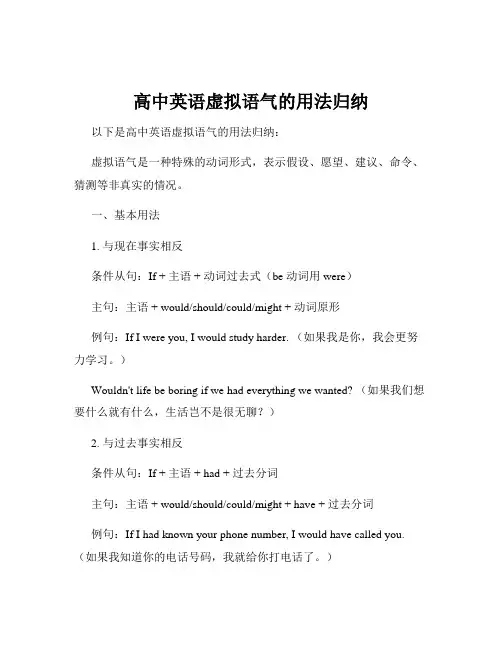
高中英语虚拟语气的用法归纳以下是高中英语虚拟语气的用法归纳:虚拟语气是一种特殊的动词形式,表示假设、愿望、建议、命令、猜测等非真实的情况。
一、基本用法1. 与现在事实相反条件从句:If + 主语 + 动词过去式(be 动词用 were)主句:主语 + would/should/could/might + 动词原形例句:If I were you, I would study harder. (如果我是你,我会更努力学习。
)Wouldn't life be boring if we had everything we wanted? (如果我们想要什么就有什么,生活岂不是很无聊?)2. 与过去事实相反条件从句:If + 主语 + had + 过去分词主句:主语 + would/should/could/might + have + 过去分词例句:If I had known your phone number, I would have called you. (如果我知道你的电话号码,我就给你打电话了。
)Couldn't you have done better if you had tried harder? (如果你再努力些,难道不能做得更好吗?)3. 与将来事实相反条件从句:① If + 主语 + 动词过去式② If + 主语 + were to + 动词原形③ If + 主语 + should + 动词原形主句:主语 + would/should/could/might + 动词原形例句:If it rained tomorrow, we would stay at home. (如果明天下雨,我们就待在家里。
)If she were to come here tomorrow, I would be very happy. (如果她明天来这儿,我会非常高兴。
)If he should fail in the exam, how disappointed his parents would be!(要是他考试不及格,他父母该多失望啊!)二、固定搭配1. wish 后的宾语从句与现在事实相反:从句用一般过去时与过去事实相反:从句用过去完成时与将来事实相反:从句用 would/could + 动词原形例句:I wish I were as tall as you. (我希望我和你一样高。
高中英语知识点归纳虚拟语气的用法与句型
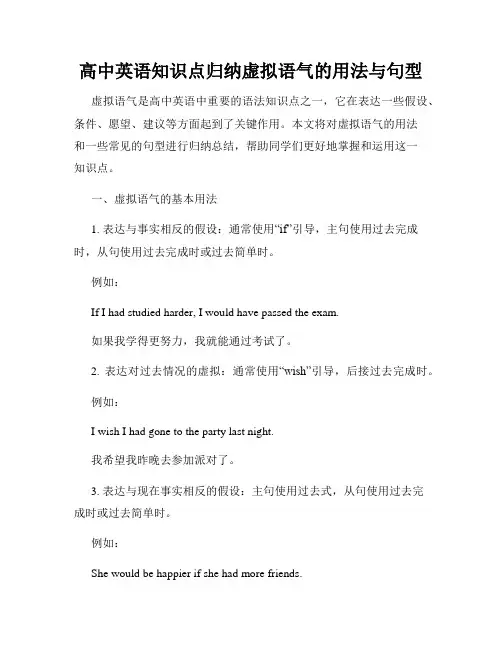
高中英语知识点归纳虚拟语气的用法与句型虚拟语气是高中英语中重要的语法知识点之一,它在表达一些假设、条件、愿望、建议等方面起到了关键作用。
本文将对虚拟语气的用法和一些常见的句型进行归纳总结,帮助同学们更好地掌握和运用这一知识点。
一、虚拟语气的基本用法1. 表达与事实相反的假设:通常使用“if”引导,主句使用过去完成时,从句使用过去完成时或过去简单时。
例如:If I had studied harder, I would have passed the exam.如果我学得更努力,我就能通过考试了。
2. 表达对过去情况的虚拟:通常使用“wish”引导,后接过去完成时。
例如:I wish I had gone to the party last night.我希望我昨晚去参加派对了。
3. 表达与现在事实相反的假设:主句使用过去式,从句使用过去完成时或过去简单时。
例如:She would be happier if she had more friends.如果她有更多朋友,她会更开心。
4. 表达对现在情况的虚拟:通常使用“wish”引导,后接过去时。
例如:I wish I were a bird and could fly in the sky.我希望我是一只鸟,可以在天空中飞翔。
5. 表达对将来的不可能或不太可能的情况:主句使用过去式,从句使用过去完成时。
例如:If I were you, I would not go to that dangerous place.如果我是你,我不会去那个危险的地方。
二、常见虚拟语气句型1. 虚拟语气与建议:It is important (necessary, advisable, essential, etc.) that + 主语 + (should) + 动词原形例如:It is necessary that you (should) finish your homework before playing games.你在玩游戏前完成作业是必要的。
虚拟语气的用法总结
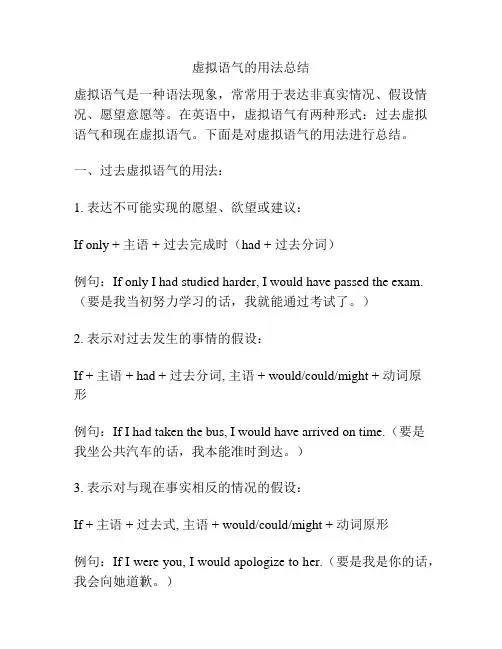
虚拟语气的用法总结虚拟语气是一种语法现象,常常用于表达非真实情况、假设情况、愿望意愿等。
在英语中,虚拟语气有两种形式:过去虚拟语气和现在虚拟语气。
下面是对虚拟语气的用法进行总结。
一、过去虚拟语气的用法:1. 表达不可能实现的愿望、欲望或建议:If only + 主语 + 过去完成时(had + 过去分词)例句:If only I had studied harder, I would have passed the exam.(要是我当初努力学习的话,我就能通过考试了。
)2. 表示对过去发生的事情的假设:If + 主语 + had + 过去分词, 主语 + would/could/might + 动词原形例句:If I had taken the bus, I would have arrived on time.(要是我坐公共汽车的话,我本能准时到达。
)3. 表示对与现在事实相反的情况的假设:If + 主语 + 过去式, 主语 + would/could/might + 动词原形例句:If I were you, I would apologize to her.(要是我是你的话,我会向她道歉。
)4. 表达对不可能实现的条件:If only + 过去式例句:If only I had a million dollars.(要是我有一百万美元该多好。
)二、现在虚拟语气的用法:1. 表达建议、命令等正式用法:表达建议:(should +动词原形/动词原形)例句:It's important (that) you should take some rest.(你应该休息一下,这很重要。
)表达命令:(应用“命令式”的虚拟形式)例句:It's vital (that) he be here on time.(他必须准时到达,这很重要。
)2. 表达愿望、要求、建议等陈述式的用法:It's time/It's high time + 过去式例句:It's time you went to bed.(你该去睡觉了,时间到了。
高中英语知识点归纳虚拟语气的特殊情况和特殊用法
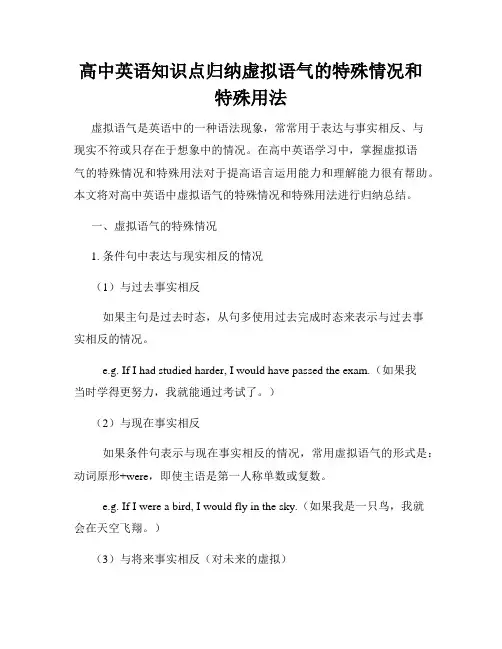
高中英语知识点归纳虚拟语气的特殊情况和特殊用法虚拟语气是英语中的一种语法现象,常常用于表达与事实相反、与现实不符或只存在于想象中的情况。
在高中英语学习中,掌握虚拟语气的特殊情况和特殊用法对于提高语言运用能力和理解能力很有帮助。
本文将对高中英语中虚拟语气的特殊情况和特殊用法进行归纳总结。
一、虚拟语气的特殊情况1. 条件句中表达与现实相反的情况(1)与过去事实相反如果主句是过去时态,从句多使用过去完成时态来表示与过去事实相反的情况。
e.g. If I had studied harder, I would have passed the exam.(如果我当时学得更努力,我就能通过考试了。
)(2)与现在事实相反如果条件句表示与现在事实相反的情况,常用虚拟语气的形式是:动词原形+were,即使主语是第一人称单数或复数。
e.g. If I were a bird, I would fly in the sky.(如果我是一只鸟,我就会在天空飞翔。
)(3)与将来事实相反(对未来的虚拟)如果条件句表示对将来事实的虚拟,常用虚拟语气的形式是:should/were to + 动词原形。
e.g. If it should/were to rain tomorrow, the picnic would be canceled.(如果明天下雨,野餐将会取消。
)2. 含蓄虚拟语气含蓄虚拟语气常用于对过去某一动作的猜测、推测或后悔等情况的表达。
常用动词有:wish, suggest, propose等。
e.g. I wish I knew the answer.(我希望我知道答案。
)3. 虚拟语气在名词从句中的使用在名词从句中,特殊情况下可以使用虚拟语气。
一般来说,主句的谓语动词应该是要求、建议、命令、感到奇怪、怀疑等含义,从句中使用虚拟语气。
e.g. It is necessary that you be here on time.(你按时到这儿很有必要。
高中英语语法个人复习总结:虚拟语气
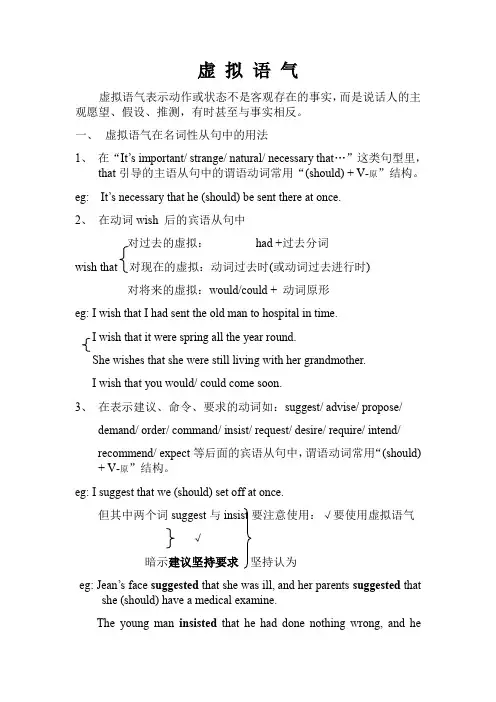
虚拟语气虚拟语气表示动作或状态不是客观存在的事实,而是说话人的主观愿望、假设、推测,有时甚至与事实相反。
一、虚拟语气在名词性从句中的用法1、在“It’s important/ strange/ natural/ necessary that…”这类句型里,that引导的主语从句中的谓语动词常用“(should) + V-原”结构。
eg: It’s necessary that he (should) be sent there at once.2、在动词wish 后的宾语从句中对过去的虚拟:had +过去分词wish that 对现在的虚拟:动词过去时(或动词过去进行时)对将来的虚拟:would/could + 动词原形eg: I wish that I had sent the old man to hospital in time.I wish that it were spring all the year round.She wishes that she were still living with her grandmother.I wish that you would/ could come soon.3、在表示建议、命令、要求的动词如:suggest/ advise/ propose/demand/ order/ command/ insist/ request/ desire/ require/ intend/recommend/ expect等后面的宾语从句中,谓语动词常用“(should) + V-原”结构。
eg: I suggest that we (should) set off at once.但其中两个词suggest与insist要注意使用:√要使用虚拟语气√暗示建议坚持要求坚持认为eg: Jean’s face suggested that she was ill, and her parents suggested that she (should) have a medical examine.The young man insisted that he had done nothing wrong, and heinsisted that he (should) be set free.4、在advice/ idea/ order/ demand/ plan/ proposal/ suggestion/ request等名词后面的表语从句和同位语从句中,谓语动词常用“(should) + V-原”结构。
高中英语高考语法知识整理复习(虚拟语气+倒装句)
高考英语虚拟语气一、虚拟条件句中的虚拟语气1、表示与现在事实相反的情况从句:If+主语+did (be动词用were)主句:主语+ should/would/might/ could + doIf I were you, I would take an umbrella.如果我是你,我会带把伞。
(事实:我不可能是你)If I knew his telephone number, I would tell you.如果我知道他的电话号码,我就会告诉你。
(事实:不知道)If there were no air or water, there would be no living things on the earth.如果没有水和空气,地球上就不会有生物。
(事实:地球上既有空气也有水)2、表示与过去事实相反的情况从句:If+主语+ had + done主句:主语+should/would/might/could+have doneIf I had got there earlier, I should/would have met her.如果我早到那儿,我就会见到她(事实:去晚了)。
If he had taken my advice, he would not have made such a mistake.如果他听我的劝告的话,就不会犯这样的错误了。
(事实:没有听我的话)3、表示与将来事实相反的情况从句:①if+主语+were to do②if+主语+should+do③if+主语+过去式(be动词用were)主句:主语+should/would/might/could+doIf he should come here tomorrow, I would talk to him.如果他明天来这儿的话,我就跟他谈谈。
(事实:不可能来)If there were a heavy snow next Sunday, we would go skating.如果下周日下大雪,我们就去滑冰。
虚拟语气用法总结(完整)
虚拟语气用法总结(完整)if+主语+had+过去分词+其他+主语+should/would/could/might+have+过去分词+其他例:1.XXX,XXX如果我知道你要来,我就会准备些食物的。
(事实:我不知道)2.XXX,XXX.如果我当时研究更努力些,我就能通过考试了。
(事实:我没有用功研究)3、表示与将来事实相反的情况:if+主语+were/should+动词原形+其他+主语+would/could/might+动词原形+其他例:1.IfIwereyou,XXX.如果我是你,我不会那样做。
(将来:我不可能成为你)2.XXX,XXX.如果下雨了,带上这把伞。
(将来:不一定会下雨)1.If I had arrived earlier。
I would have been able to meet her。
(Fact: I arrived late)2.If he had XXX my advice。
he would not have made such a mistake。
(Fact: He didn't listen to me)3.If he were to come here tomorrow。
I would talk to him。
(Fact: It's XXX he will come)In expressing ns。
orders。
requests。
etc。
the subjunctive mood is often used in the object clause。
with the verb in the form of "should + infinitive," which can be omitted.Other uses of XXX:1.The subjunctive mood is used in the object clause after "wish" to express a XXX fact。
高中英语知识点归纳虚拟语气的用法
高中英语知识点归纳虚拟语气的用法虚拟语气是英语语法中的一个重要概念,用于表达虚假、条件或假设等非真实情况。
在高中英语教学中,虚拟语气的用法被广泛涉及。
本文将归纳总结高中英语中常见的虚拟语气用法,以便帮助学生更好地掌握和应用。
一、虚拟语气在条件句中的用法1. 第一类虚拟条件句第一类虚拟条件句表示与现在事实相反的假设情况,即主句谓语动词用一般过去时,条件句用“动词过去式”或“were”。
例句1:If I had more time, I would travel around the world.如果我有更多的时间,我会周游世界。
例句2:If he were here, he would help you.如果他在这里,他会帮助你。
2. 第二类虚拟条件句第二类虚拟条件句表示与过去事实相反的假设情况,即主句谓语动词用“过去完成时”,条件句用“过去完成时”或“动词过去完成式”。
例句1:If I had studied harder, I would have passed the exam.如果我学得更刻苦,我就会通过考试了。
例句2:If she had taken the bus, she wouldn't have been late.如果她坐公交车,她就不会迟到了。
二、虚拟语气在建议、命令和要求中的用法虚拟语气在建议、命令和要求中的用法是表示一种非真实或非直接的语气,用于表达对诉求对象的建议、命令或要求。
例句1:I suggest that he go to bed early.我建议他早点上床睡觉。
例句2:The teacher insisted that the students hand in their homework on time.老师坚持要求学生们按时交作业。
三、虚拟语气在感叹句中的用法虚拟语气在感叹句中的用法用于表达对现实情况的不满或对希望的夸大。
例句1:If only I were a bird and could fly freely in the sky!如果我是一只鸟,能自由地在天空中飞翔该多好啊!例句2:How I wish I had a magic wand to make all my dreams come true!我多希望我有一根魔法棒,让我的梦想都实现!四、虚拟语气在建立条件句中的用法虚拟语气在建立条件句中的用法用于建立一种假设条件,以进一步推断结果。
高中英语知识点归纳虚拟语气的用法和种类
高中英语知识点归纳虚拟语气的用法和种类虚拟语气是英语语法中的一个重要部分,它用来表达与现实事实相反、与过去事实相反、与将来事实相反和与现在事实相反的情况。
掌握虚拟语气的用法和种类对于高中英语学习者来说至关重要。
本文将对虚拟语气的用法和种类进行归纳总结。
一、与现实事实相反的虚拟语气1. 虚拟条件句虚拟条件句用来表示与现实相反的情况。
它的一般形式是:if + 主语(过去式)、主语(were) + 动词的过去分词,主语 +would/should/might/could + 动词原形。
例如:- If I were a bird, I would fly in the sky.(如果我是一只鸟,我会在天空中飞翔。
)- If he had studied harder, he would have passed the exam.(如果他学得更努力,他就会通过考试。
)2. 虚拟表达愿望或建议的句子虚拟语气在表达愿望或建议时常常被使用,常见的形式是:主语 + 过去式 + 动词原形。
例如:- I wish I had more time to travel.(我希望有更多的时间旅行。
)- She suggested that he go to the library.(她建议他去图书馆。
)二、与过去事实相反的虚拟语气1. 过去完成时的虚拟语气过去完成时的虚拟语气表示过去某个时间已经发生但实际并未发生的情况,常用的形式是:had + 动词的过去分词。
例如:- If I had known you were coming, I would have prepared a meal.(如果我知道你要来了,我会准备一顿饭的。
)- He wished he had studied harder when he was in high school.(他希望当他还在高中时学习更努力。
)2. 过去简单时的虚拟语气过去简单时的虚拟语气表示过去某个时间未发生的情况,常用的形式是:动词的过去式。
- 1、下载文档前请自行甄别文档内容的完整性,平台不提供额外的编辑、内容补充、找答案等附加服务。
- 2、"仅部分预览"的文档,不可在线预览部分如存在完整性等问题,可反馈申请退款(可完整预览的文档不适用该条件!)。
- 3、如文档侵犯您的权益,请联系客服反馈,我们会尽快为您处理(人工客服工作时间:9:00-18:30)。
虚拟语气的用法总结语气:语气是动词的一中形式,它表示说话人对某一行为或事情的看法和态度。
语气的种类:(1)陈述语气表示动作或状态是现实的,确定的或符合事实的,用于陈述句,疑问句和某些感叹句。
如We are ready. What a fine day it is!(2)祈使语气表示说话人的建议,请求,邀请,命令等。
如Open the door, Please.应注意以下几点:1.主语通常是第二人称you,但多不出现,动词用原形,否定用do not 或者don’t加动词原形(或be)如Be careful next time. Don’t smoke here.2.有时为了强调,主语也可以出现,而且可以是第三人称,谓语动词不加-s或者-es 如You be quiet. He stand up.3.祈使语气可以用do加强语气如Do come to see this Sunday.4.在Let’s 的祈使句后,疑问部分通常用shall we;在Let us后,疑问部分用will you 如Let’s go out for a walk after supper,shall we? /Let us clean our classroom, will you?5.祈使句与连词and连用时相当于一个条件句,而and之后则是表示结果。
如Think hard and you will have a good idea.(3)虚拟语气表示动作或状态不是客观存在的事实,而是说话人的主观愿望,假设或推测等。
如If I were you, I should study English.一.虚拟语气在条件从句的用法条件句有两类,一类是真实条件句;一类是非真实条件句,也就是虚拟条件句。
如果假设的情况是有可能发生的,就是真实条件句,谓语要用陈述语气。
如If it doesn’t rain tomorrow, we will go to the park.如果假设的情况是过去或现在都不存在的,或将来不大可能发生的,则是虚拟条件句。
如If he had seen you yesterday, he would have asked you about it. 在含有虚拟条件句的复合句中,主句和从句的谓语都要用虚拟语气,列表如下:例如:If he were here, everything would be all right.If her mother had taken the doctor’s advice, she would/might have got well earlier.If it were to rain tomorrow, the match would be canceled.有时候省略if,采用局部倒装语序。
把had /should/were 等动词(不包括行为动词)移到从句的句首。
例如:Were it to rain tomorrow, our picnic would be canceled.Had it not been for the storm, we would have arrived in time.Should the earth stop running, what would happen?二. 错综时间条件句有时条件从句的动作和主句动作发生的时间不一致,这时需要根据意思采用表示不同时间的动词形式来进行调整。
If she had taken the doctor’s advice, she might still be alive.If I were you, I would have accepted their terms.三.含蓄条件句1.有时候假设的情况并不用条件从句表示出来,而是通过介词短语来表示。
如Without air(If there were no air), there would be no living things.But for your help (If it hadn’t been for your help), I couldn’t have done it.2. 假设的条件通过上下文表现出来。
I would go abroad for further study but that I am poor.I was ill that day. Otherwise I would have taken part in the party.3. 表示虚拟语气的主句或从句有时可以省略,但其含义仍可以推知。
(1)省去条件从句You could have washed your clothes yourself. (你本可以自己洗衣服的。
)省去了If you had wanted to。
(事实是:你自己没洗衣服,因为你不想洗。
)(2)省去主句(常用以表示愿望)If my grandmother were with me! (如果我的祖母和我在一起多好啊!)事实是:祖母已不在世。
四、虚拟语气在名词性从句中的应用① “wish+宾语从句”表示不可能实现的愿望,汉语可译为“可惜……、悔不该……、但愿……”。
表示现在不能实现的愿望,从句的谓语动词用过去式;表示将来不可能实现的愿望用“would/could+动词原形”;表示过去不可能实现的愿望时用“had+过去分词”。
如:I wish I were better-looking. 要是我长得再漂亮些就好了。
I wish I had met the film star just now. 我要是刚才遇到那位电影明星该多好啊!I wish I would be a solider. 我想当一名军人。
【考例】How I wish every family a large house with a beautiful garden! (上海2002春)A. hasB. hadC. will haveD. had had【答案】B。
① 在表示建议、要求、愿望、命令、坚持、想法(advise, command, demand, decide, desire, insist, order, prefer, propose, request, require, suggest)等动词后面的宾语从句,或这些动词的同源名词后面所跟的同位语从句或表语从句中,从句谓语用“should+动词原形”,其中在美国英语中,should常省略。
如:The young man insisted that I (should) go with his fellows. 这个年轻人坚持要我同他的同伴们一起去。
The doctor advised that he change his job. 医生建议他换工作。
【考例】Teachers recommend parents their children under 12 to ride bicycles to school for safety. (福建2010)A. not allowB. do not allowC. mustn’t allowD. couldn’t allow【答案】A。
① 在would rather后的宾语从句中,谓语常常用过去时来表示现在或将来的情况,用过去完成时表示过去的情况。
如:— Shall I open the window? 我可以把窗户打开吗?— I’d rather you didn’t. 我觉得还是不要。
【考例】George is going to talk about the geography of his country, but I’d rather he more on its culture. (江苏2010)A. focusB. focusedC. would focusD. had focused【答案】B。
① 在It is +形容词(important, necessary, good, right, wrong, better, natural, proper, funny, strange, surprising) +that从句中,谓语动词的虚拟语气用“(should)+动词原形”的结构。
如:It is natural that she (should) do so. 很自然她应该这样做。
【考例】— Don’t you think it necessary that he to Miami but to New York?— I agree, but the problem is he has refused to. (江苏2005)A. will not be sent; thatB. not be sent; thatC. should not be sent; whatD. should not send; what【答案】B。
五、虚拟语气在状语从句中的应用1. if only的条件状语从句中的虚拟语气if only 与I wish一样,也用于表示与事实相反的愿望,其后所接虚拟语气的时态与wish 后所接时态的情况相同。
如:If only the player had had more courage! 这位选手再多有一些勇气就好了。
If only Daisy would go with me! 黛茜要是愿意和我一起去就好了!【考例】Look at the trouble I am in! If only I your advice. (上海2003春)A. followedB. would followC. had followedD. should follow【答案】C。
2. as if (as though)方式状语从句中的虚拟语气as if (as though)引导的方式状语从句可用陈述语气,也可用虚拟语气。
(1) as if 从句用陈述语气的情况。
当说话者所述的是真实的或极有可能发生或存在的事实时。
如:It sounds as if it is raining. 听起来像是在下雨。
(2) as if 从句用虚拟语气的情况。
当说话人认为句子所述的是不真实的或极少有可能发生或存在的情况时。
从句虚拟语气动词时态的形式如下:① 从句表示与现在事实相反,谓语动词用一般过去时。
如:He talks as if he knew where she was. 他说话的样子,好像他知道她在哪里似的。
① 从句表示与过去事实相反,谓语动词用“had+过去分词”。
如:He talks about Rome as if he had been there before. 他说起罗马来好像他以前去过似的。
